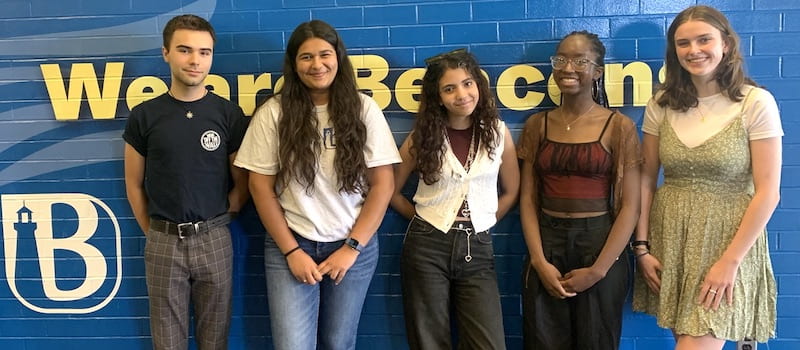They are in their early 20s and entering their junior years at UMass Boston, with their whole careers waiting ahead of them. Yet in their work at UMass Boston’s Center for Social and Demographic Research on Aging, five undergraduate research assistants find themselves considering the lives of people on the other end of the adulthood spectrum.
CSDRA, one of four centers housed within the Gerontology Institute, has seen its work with Massachusetts communities mushroom in recent years. More towns and cities are turning to the center to help them assess the needs of their older residents and to recommend the best way to meet those needs. Working under the guidance of CSDRA Director Caitlin Coyle and senior doctoral students, the students contribute to all aspects of the center’s work, including coding survey results from older residents, taking notes in focus groups and community forums, and analyzing qualitative survey responses. Coyle and her doctoral student team encourage the undergraduates to think of ways to use their experiences to develop their own research questions.
“I’ve definitely learned a lot about aging communities and their needs, which is something I’ve never thought about before,” says Sabrin Zahid, who has interned at CSDRA for almost a year. “Before working here, the only interaction I’d had with older people was with my grandparents. Now I’m learning about older people’s housing needs and about how many of them want to downsize but how hard it is to do.”
Agrees Roisin O’Keeffe, “I hadn’t ever given much thought to what it’s like to be retired. I’m 20 years old and thinking about starting my career, not about what comes after that.”
Their CSDRA work also is opening the students’ eyes to the field of gerontology and to the possibilities of social policy and applied research in their future schooling and careers. Daniel Caron had never heard of gerontology before he started as an intern in February—and he still has to explain it to family and friends. A psychology major, he may move his studies toward the psychology of aging; he signed up for that class for the fall semester. He began the internship coding survey responses, then moved to taking notes at the forums and working with the information they bring back. He enjoys learning about how public funding works and what it means for taxpayers. “I love the social work aspect of this work,” Caron says.
Bendu David is majoring in women, gender, and sexuality with double minors in psychology and political science. In the spring semester, David took a political research methods class that opened new possibilities. “I never thought you could look at research through a political science lens, and I realized I was really interested,” they said. The internship reinforces this new interest while widening David’s appreciation for civic engagement, begun in high school
“I am so grateful that our center offers these opportunities. Undergraduate research experiences enrich a student’s classroom learning and supports the development of a range of skills,” says Coyle, who was recently named CSDRA’s director. “Our current team is made up of really bright undergraduates who bring curiosity and energy to the work, which keeps it fun.”
Himani Pachchigar, a nursing major, codes survey responses but also is helping the CSDRA staff create a training program for nursing students that helps them understand how ageist language can serve as a barrier to clinical practice with older adults. Doing computer-based research is a big contrast from her previous work with University Health Services, where she was on her feet most of the time and interacting with patients. But she welcomes the change and the chance to learn new skills. Although all nursing students gain certified nursing assistant, or CNA, experience, gaining research experience, especially with work that helps communities, helps Pachchigar’s resume stand out. She was game to explore her options, she says. “I don’t believe I can only help people by working in a hospital.”
“I’ve definitely learned more about how to conduct a research project,” Pachchigar says, including the iterative process with team members suggesting changes along the way. “I love how communicative everyone in the office is, and how supportive they are.” O’Keeffe, a CSDRA intern for six months, is majoring in biology with a focus in genetics and a minor in art history. “I love preparing the surveys. I really like organizing things,” she says. One of the important lessons the internship has taught her is that the right job can be fulfilling. “Our supervisors. Ceara [Somerville] and Sara [Collins] are fantastic. Everything about this job is satisfying. I actually really enjoy coming to work.”


Leave a Reply